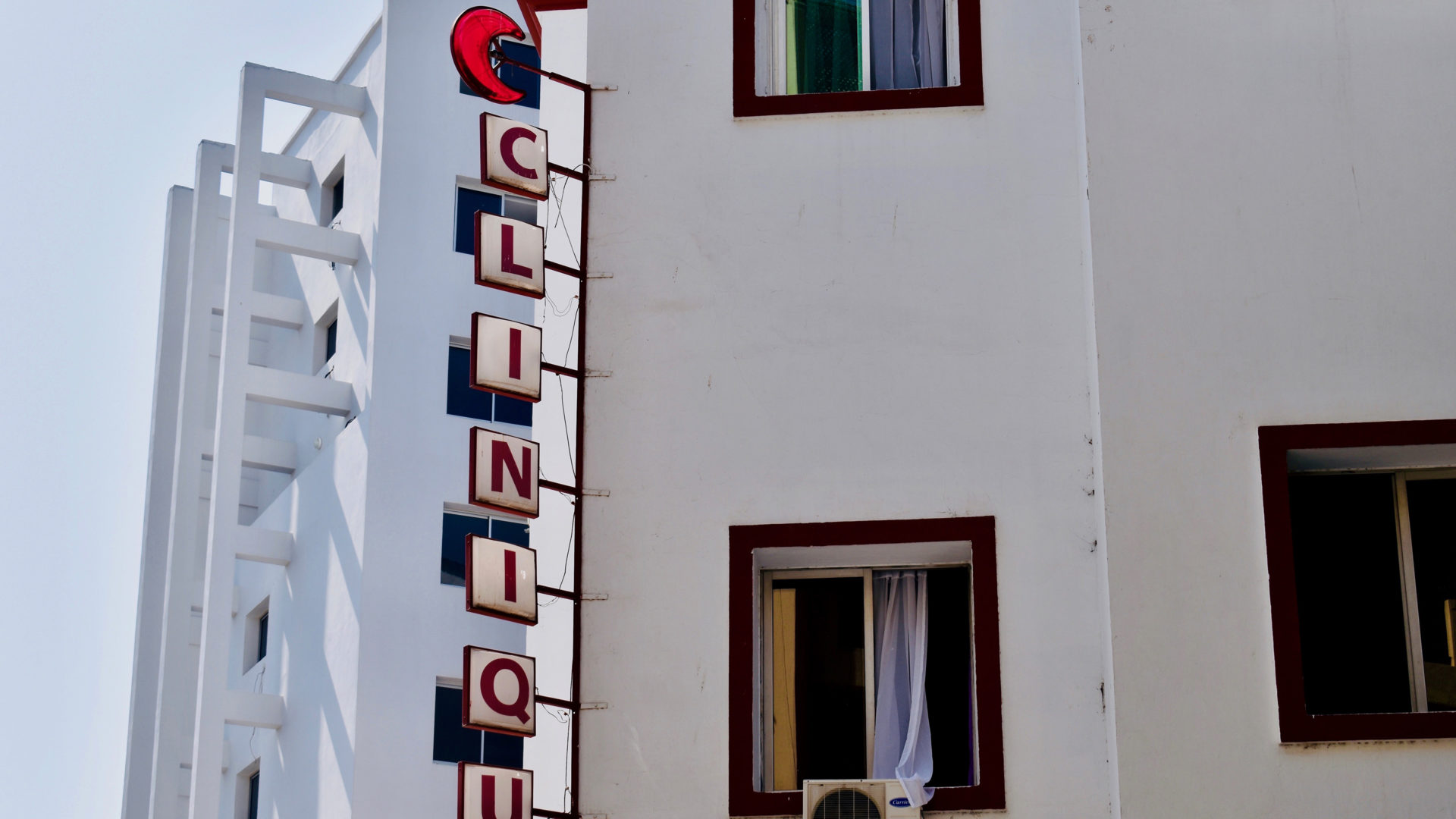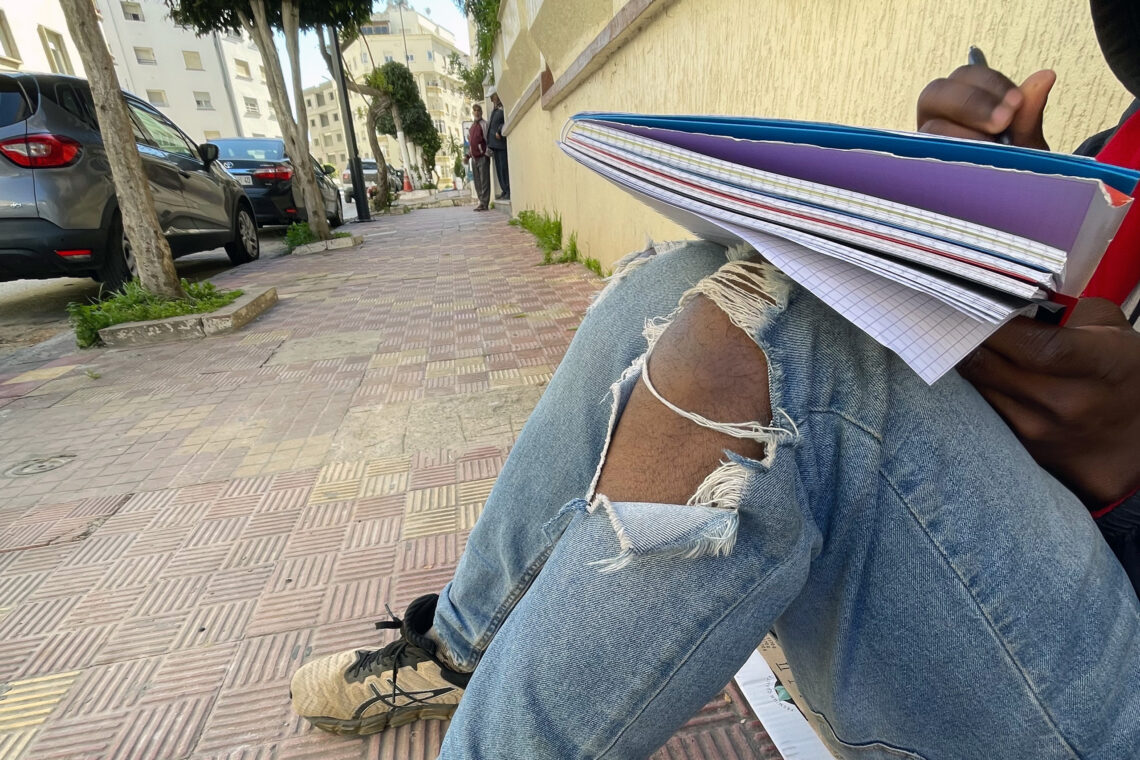Walking through the doors of Clinique Croissant Rouge, I didn’t even have to look at the people in the waiting room to know they were glaring at me. My attention turned to the sound of a young child’s screams, to smudged walls, and to nurses racing around in Birkenstocks. I wouldn’t want to work here, I said under my breath, then bit my tongue, reminding myself not to make such shallow judgments. Morocco doesn’t have the tens of billions America does for its healthcare infrastructure.
I forced myself to focus on why I was at the clinic. I had taken the risk to come to Morocco because I wanted to hear other nurses’ stories. I wanted to learn why they chose a career in healthcare despite the difficult working conditions. How do my Tangier colleagues deal with being pulled in every direction? My motivation to become a nurse comes from caring for my father during his battle against cancer. Are Moroccan nurses, likewise, motivated by a basic desire to help others?
To find out, Douaa, my campus coordinator, was kind enough to organize an interview with Khadija, one of the nurses at Clinique Croissant Rouge. I recall being ushered to a small, ramshackle room in the back of the clinic. The musty smell and scuffed walls reminded me of an old basement.
Khadija sat across from me, her fingers interlaced in her lap. Her stiff white shirt contrasted with the dingy walls, making her glow like an angel. Legs crossed, she sank into the chair. I noted a tough smile on her face and a sparkle in her eye.
I began by asking Khadija some basic questions about her life. In a quiet yet steely tone, she told me that she grew up in Tangier with her parents, older sister, and grandmother. She and her older sister were practically inseparable.
Sensing that she was becoming more comfortable with me, I asked if her parents were supportive of her becoming a nurse. Yes, she said. Her parents were open-minded, and when they saw how badly Khadija wanted to become a nurse, they supported her getting a job before marriage and pursuing a career as a nurse. This support was important because, at the time, there was a stigma attached to nursing. She told me that the nursing profession used to be frowned upon due to customs and traditions. “Female nurses have to interact with male patients, and for some people that violates modesty.”
I asked her how she overcame such prejudices.
“I just believed in myself and kept helping people.” Her integrity resounded with every word she spoke. “Most Moroccan women,” she continued, “stay home where they clean, cook, and care for their families while the husband is out working. I didn’t want to be that woman.”
I could see the strain her career put on her. There were bags under her eyes and what was probably back pain made her shift positions in her chair.
Impatient and wanting to hear more of Khadija’s story, I blurted out, “What are the hardest parts about your job?”
She began by telling me that there is no typical day as a nurse. While scheduled to work a 42-hour week, “It’s never like that. I can work the day shift or the night shift and the hours are long, and if the hospital is busy, I just have to stay. I drop everything and come to work if they call on my day off.” She spends more time at the clinic than with her husband and son.
Before I could ask a follow-up question, Khadija began telling me about more difficulties of her job. “The hardest thing is when patients are making progress and we suddenly lose them. It’s hard when they are young, too.”
I responded by telling Khadija about my experience with my father. For a time, it had seemed he was beating the cancer; however, his condition quickly changed due to the rapid spread of the disease and my Dad was given only six more months to live.
After offering condolences for my loss, Khadija counseled me that the passing of patients should act as motivation to keep helping other patients. “I may lack the power to change the outcome of their illness, but I strive to help my patients as well as I can. What I keep telling myself is that what I do might keep them alive a little longer.”
Hearing Khadija say that put a smile on my face because the exact ideas ran through my mind after the loss of my father. Even though I did everything I could to help him, it wasn’t enough; however, his loss made me want that motivated me to want to care for others for the rest of my life and hopefully change the outcome of their illnesses.
After pausing and reflecting on what I said, Khadija jumped to the theme of difficult patients. Sometimes she’s tired, overworked, and overwhelmed with too many patients in an overcrowded hospital, and patients start complaining that the hospital only wants their money.
“How do you deal with it, Khadija?”
“In Morocco,” she said, “the patients are the king. They may say hurtful things, but I have to brush it off because I’m there for them.” After all, the patients are the ones who are suffering from debilitating pain or questioning what they have to live for.
No wonder she is a nurse, I thought. I couldn’t help but look at her closely again. Her shoulders slouched from the physical demands of standing all day. Beads of sweat were dripping from her headscarf. I’d asked so many questions already about Khadija’s job, but it was time to ask the most personal question of all. I say personal because in our fraternity of nurses, I looked at her as a guide in preparing for a difficult career.
“How do you do it?” I asked. “How do you cope with the hardships of your career?”
The exhausted, middle-aged nurse looked straight into my eyes, took a deep breath, giggled, and said “Well…”
My mind blocked out other noises around me but Khadija’s time-wizened voice. I felt as if I was in a daydream. “I put others before myself so often that I don’t even listen to myself anymore . . . I do it for humanity.” Her formula for success was this: “Have patience, be kind, and have the mindset of giving without getting anything back.”
I reflected on Khadija’s motto “I do it for humanity” the entire way back to campus. She may work in a different country where hospitals don’t have the resources we have in America. But I’ve rarely encountered a nurse more passionate about helping people. As the taxi pulled up to the University of New England Tangier campus, I felt a renewed passion about my future career. I’m not a nurse yet, but I am determined to take on every obstacle that a nursing career throws my way.
The following day, I was sitting in my dorm room and so overwhelmed by my coursework that I questioned why I ever decided to go to nursing school, so I listened to the recording of my interview with Khadija. I needed a reminder of the struggles that she faces in her career each day. Her ability to overcome obstacles was just what I needed to hear.






Comments are moderated by the editor and may not appear on this discussion until they have been reviewed and deemed appropriate for posting. All information collected is handled in a manner consistent with our privacy policy.